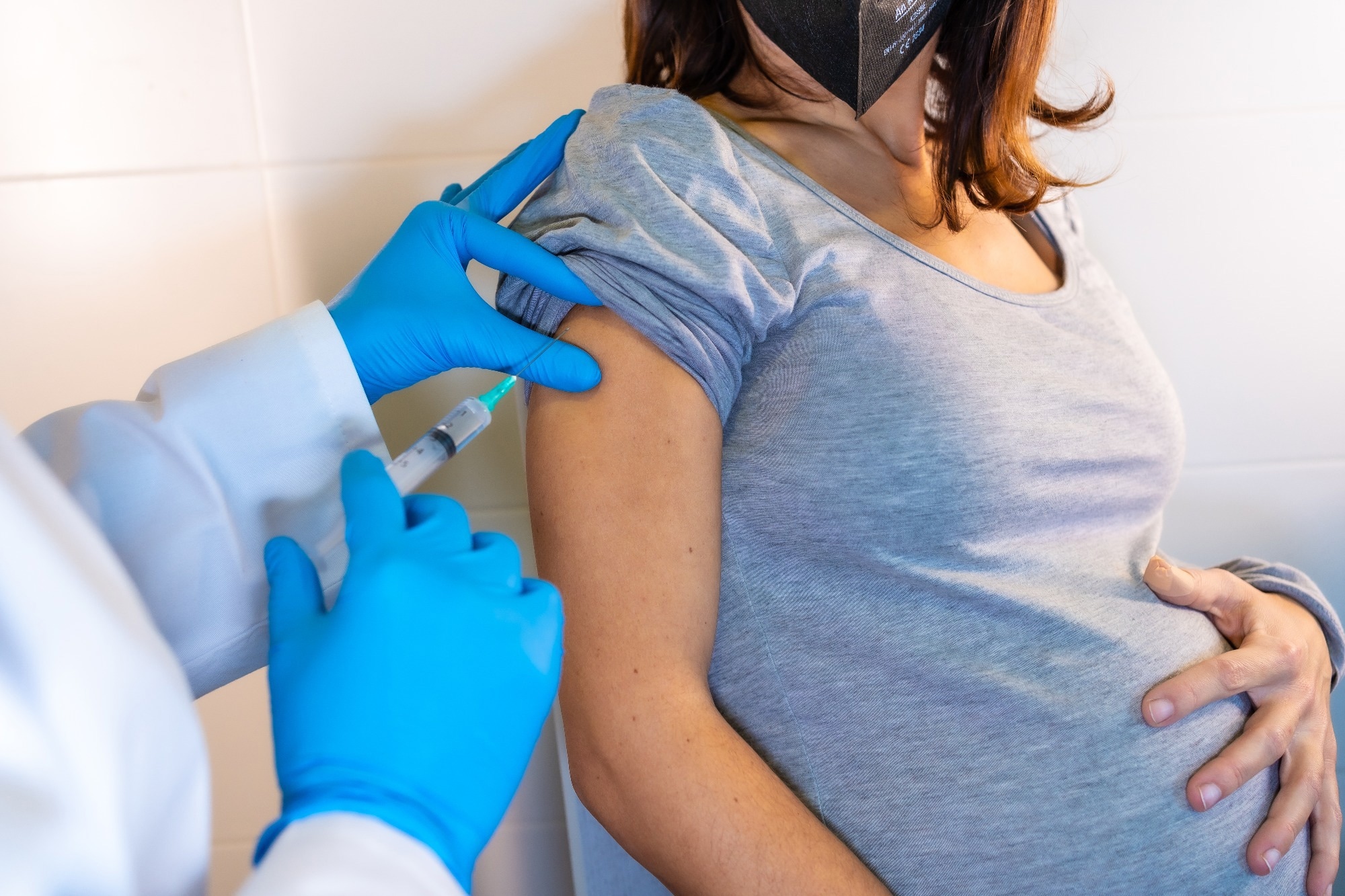In a recent study published in the journal JAMA Network, researchers investigated the potential association between COVID-19 mRNA vaccine administration in pregnant women and adverse events in their newborns. They used an extensive sample cohort comprising 94,303 cases and 102,167 controls and found that not only are mRNA vaccines not associated with adverse outcomes, but they instead were found to reduce the Odds Ratios (ORs) of neonatal cerebral ischemia and hypoxic-ischemic encephalopathy, intracranial hemorrhage, and mortality. These findings support vaccination efforts and recommendations for immunization during pregnancy administered by various authorities.
 Study: Neonatal Outcomes After COVID-19 Vaccination in Pregnancy. Image Credit: Unai Huizi Photography / Shutterstock
Study: Neonatal Outcomes After COVID-19 Vaccination in Pregnancy. Image Credit: Unai Huizi Photography / Shutterstock
Why do pregnant women need COVID-19 vaccines?
The coronavirus disease 2019 (COVID-19) pandemic is one of the most socioeconomically, medically, and infrastructurally devastating global conditions in recent times. Since its discovery in Wuhan, China, in late 2019, the pandemic has infected more than 700 million individuals and claimed almost 7 million lives. Thankfully, global vaccination efforts have made great strides in restricting virus transmission and preventing novel outbreaks. Mono- and polyvalent messenger RNA (mRNA) vaccines have proved especially efficient in controlling disease spread.
Research aimed at elucidating the impacts of COVID-19 vaccinations during pregnancy has found that vaccination is an effective form of anti-COVID-19 immunization for both mothers and their unborn/newborn infants, prompting various global authorities to recommend its use. Unfortunately, previous literature aimed at evaluating vaccination safety in this nuanced group used limited sample sizes, thereby limiting their analytical power and allowing anti-vaccination camps grounds for debate despite their general positive results.
Unconfirmed reports about potential neonatal brain lesions have prompted authorities and even clinicians to express concern about the necessity of vaccination during pregnancy. Elucidating the benefits of during-pregnancy vaccinations and establishing their safety in a large-cohort case-control study would silence the critiques and may result in beneficial anti-COVID-19 interventions in the future.
About the study
In the present study, researchers conduct a holistic evaluation of the neonatal safety of mRNA vaccines aimed at settling concerns expressed by authorities, clinicians, and anti-vaccine groups on the necessity of vaccinations received during pregnancy. Since the potential for vaccine-associated neonatal brain lesions is a recurring claim, this study prioritized elucidating neonatal cerebrovascular outcomes.
The study sample cohort was derived from a population-based cohort study carried out in Norway and Sweden comprising all live births at 22 weeks or more, including newborn infants displaying congenital disabilities as defined by the European network of population-based registries for the epidemiologic surveillance of congenital disabilities. Since this work focused on the safety of mRNA vaccines, vaccination data for other vaccine types was omitted from the analyses. Applying exclusion criteria still accounted for 97.4% and 98.6% of all live births in Sweden and Norway, respectively.
The study was from January 2021 to January 2023, during which 94,303 (vaccinated) cases and 102,167 (unvaccinated) controls were born. Demographic (nationality, education level, living with partner, age, parity, smoking status, and body mass index [BMI]) and medical (prepregnancy comorbidity, season of conception, gestational diabetes, multiple or singleton pregnancy, mode of delivery, and COVID-19 infection status) data were collected from eight different national registers using unique personal identity numbers. Vaccination data included the number of mRNA vaccine doses received (before and during pregnancy), vaccine manufacturer, time from last vaccination to birth (days), and time from conception to last vaccination (days).
“The exposure was vaccination with mRNA vaccine against COVID-19 during pregnancy, irrespective of previous mRNA vaccination, number of doses during pregnancy, or vaccine manufacturer. Vaccination during pregnancy was defined as vaccination any time between dates of conception and delivery. The vaccines recommended for pregnant individuals were the 2 mRNA vaccines manufactured by Pfizer-BioNTech (BNT162b2) and Moderna (mRNA-1273).”
All outcomes were defined and measured based on the International Statistical Classification of Diseases and Related Health Problems, Tenth Revision codes. Associations were estimated using multivariable analyses adjusted for covariates. Odds Ratios (ORs) were computed using logistic regression. Data from Sweden and Norway were first analyzed independently, then pooled, and reanalyzed.
Study findings and conclusions
Vaccination was not observed to have any adverse neonatal outcomes. In contrast, infants who were born to mothers who received anti-COVID-19 mRNA vaccines during pregnancy were less likely to be preterm, have a low Apgar score, or be born small for gestational age (SGA). Encouragingly, vaccination was further associated with lower ORs of neonatal nontraumatic intracranial hemorrhage and neonatal mortality. If the vaccine was received during the second trimester, cerebral ischemia and hypoxic-ischemic encephalopathy risks were further reduced.
“This large population-based safety study found no evidence of increases in adverse neonatal events in infants born to individuals vaccinated against COVID-19 during pregnancy. In contrast, exposure to COVID-19 vaccination during pregnancy was associated with reduced rates of nontraumatic intracranial hemorrhage, hypoxic-ischemic encephalopathy, and neonatal mortality.”
These findings may help silence anti-vaccine critiques and address the concerns of authorities and clinicians that COVID-19 mRNA vaccines are both safe and beneficial for use during pregnancy. While stringent observations of vaccinated mothers must be carried out, these results pave the way for renewed vaccination efforts, which may further ongoing progress in putting the pandemic to rest.

 PARENTING TIPS
PARENTING TIPS PREGNANCY
PREGNANCY BABY CARE
BABY CARE TODDLERS
TODDLERS TEENS
TEENS HEALTH CARE
HEALTH CARE ACTIVITIES & CRAFTS
ACTIVITIES & CRAFTS

